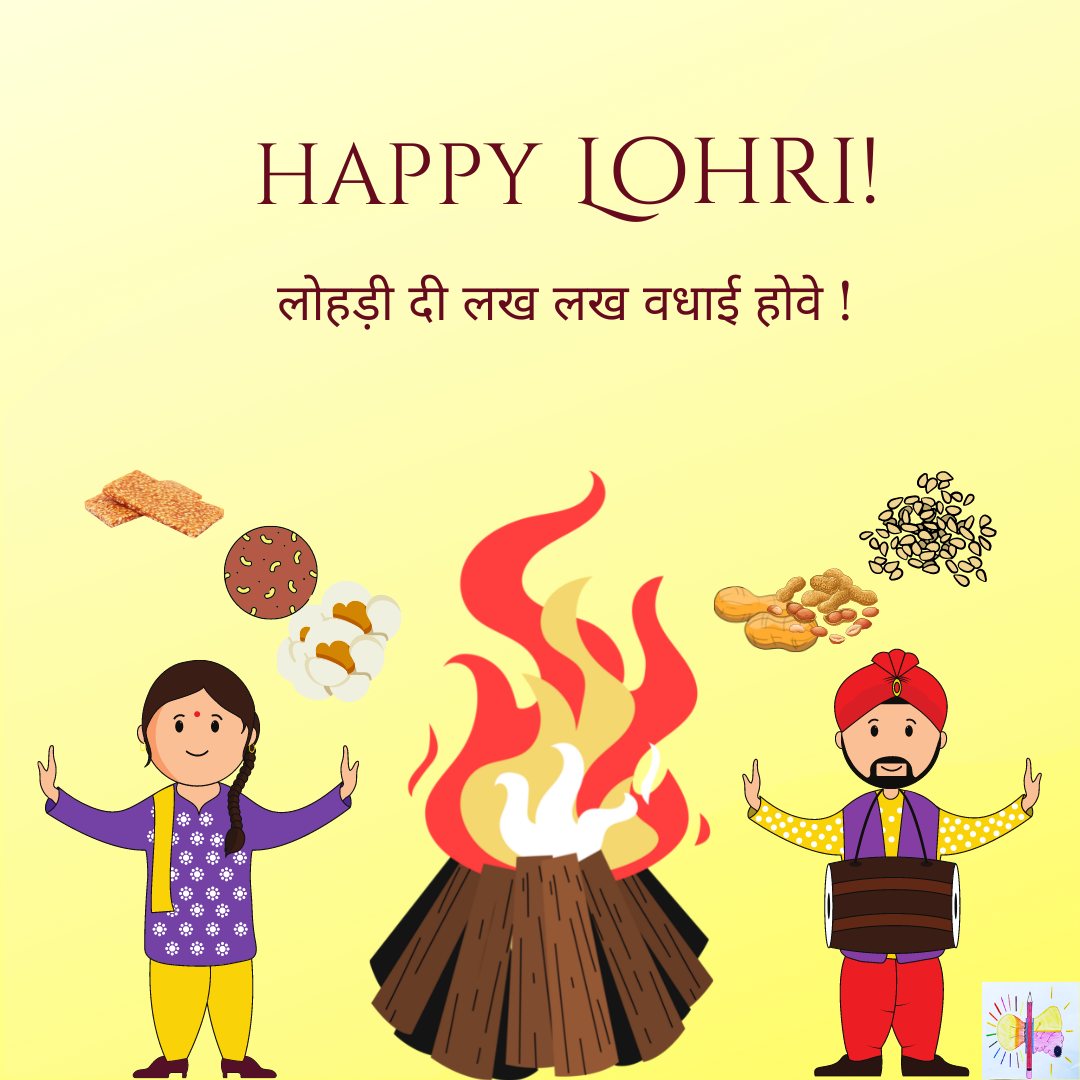On the day of Lohri, children get together and go from house to house. Girls and boys form separate groups.
They sing a song at the door and the lady of the house gives them Lohri goodies.
These goodies are shared by the children later.
Lohri Song for Girls
“Hulle nee maiyee hulle
do beri patte jhulle
do jhul payeaan kahjurran
khajurran suttya meva
es munde de ghar mangeva
es munde di voti nikdioh!
khandi choori, kutdi Kut! Kut!
Bharaya thaal woti bave nananaa nal
Ninaan te wadi parjaee
So kudma de ghar aayee!
Chant
mein lohri lain aayee!”
Translation
“Two berry leaves are hanging,
Two date leaves are also hanging
The tree shed the fruit
There’s an engagement in this boy’s house
This boy’s wife is short
She eats and grinds choori(a punjabi dish)
She grinds and grinds and fills the plate.
the wife sits with her sisters in law
Sister in law and the elder son’s wife
Are in their in-laws house
Chant
I have come to take my Lohri ”
Lohri song for boys
(T h e ‘ho’s are in chorus)
Sunder mundriye ho!
Tera kaun vicaharaa ho!
Dullah bhatti walla ho!
Dullhe di dhee vyayae ho!
Ser shakkar payee ho!
Kudi da laal pathaka ho!
Kudi da saalu paatta ho!
Salu kaun samete!
Chache choori kutti!
zamidara lutti!
Zamindaar sudhaye!
bade bhole aaye!
Ek bhola reh gaya!
Sipahee pakad ke lai gaya!
Sipahee ne mari eet!
Paheenve ro te phannve pit! ”
Sanoo de de lohri te teri jeeve jodi!
Translation
Oh nice ringing one!
Who do you have
The groom with the tandoor
The groom’s daughter got married
He gave 1 ser sugar!
The girl is wearing a red suit!
But her shawl is torn!
Who will stitch her shawl?!
The uncle made choori!
The landlords ate it!
He made the landlords eat a lot!
Lots of innocent guys came
One innocent boy got left behind
The police arrested him!
The policeman hit him with a brick!
Cry or howl!
Give us lohri ..long live your jodi!”
What are the Lohri goodies
Lohri is the harvest festival of Punjab. At this time, maize, sesame, and peanuts have been harvested.
So, Lohri goodies are popcorn, peanuts, peanut chikki, sesame seeds chikki, and a sweet called bhugga, made of milk, jaggery and sesame seeds.
Evening – The Lohri Fire
In the evening, a community bonfire is lit. Traditional Dhol, Bhangra, and Gidda are performed. Bhangra is the traditional Punjabi dance for men, while Gidda is the traditional dance of Punjabi women.
Everyone dresses up for the occasion.
People circumambulate (go around) the Lohri fire, throwing fresh produce like popcorn, peanuts, etc. into the holy fire and praying to Lohri Mai to make the new year happy for them and their families.
At night, khichdi made of rice and chana dal is made and put aside.
The following morning: Maghi
Maghi is the start of Magh month of Indian calendar and the start of the Punjabi new year.
2 rituals mark Maghi.
Po Riddhi, Maagh Khaadi
The khichdi that is cooked on Lohri night is eaten as breakfast by the family together. With this, we bid goodbye to everything that was the last year. This is our final connection with the year that was.
Til Mooli Chakhna: Resolutions for the New Year
The next tradition is til mooli chakhna.
White radish, which is a seasonal vegetable, is cut into small pieces, more vertical than horizontal. Like this:

Black sesame seeds are used for this ritual.
Every member of the family takes the mooli (radish) in their right hand and holds some black sesame seeds in the left.
Then, they do this ritual with another member of the family, preferably someone elder to them.
These are their 5 resolutions for the new year.
The first line is:
Til Mooli chakhaan? (Should I taste the til and mooli?)
To which the elder replies:
Chakho ji! (Please do)
After this, they choose 4 things that they want to do in that year.
Some samples are:
Ghar parivar rakhan? (Should I invest in my family this year?)
The elder responds: Rakho ji! (Please do)
Vidya da daan rakhaan?
Response: Rakho ji!
Izzat Maan, karobar rakhaan?
Response: Rakho ji!
Vaddeyaan da naam, sab da aitbaar rakhaan?
Response: Rakho ji!
Maa pyo rakhaan? (Should I have my parents in the coming year?)
Dhan daulat izzat ikhlaq rakhaan? (Should I keep money, respect and love?)
Ghar di such shanti, deh arogyata rakhaan? (Wishing for peace at home and health)
Aye paraune da maan, guruvaan da naam rakhan? (Wishing for respect for all visitors who enter my door and prayer in the coming year)
A student might wish for Vidya da daan (gift of erudition)
A young married person might ask for harmonious relations in his/her married life.
The idea of this ritual is to choose 4 things that matter to us, and to resolve to keep them in the coming year. They could be family, education, health, money, trust, traditions, anything.
The person chooses their 4 vows independently. There is no pressure or expectation.
With this, we formally step into the new year, having bid adieu to the old, and made resolves for the new.

